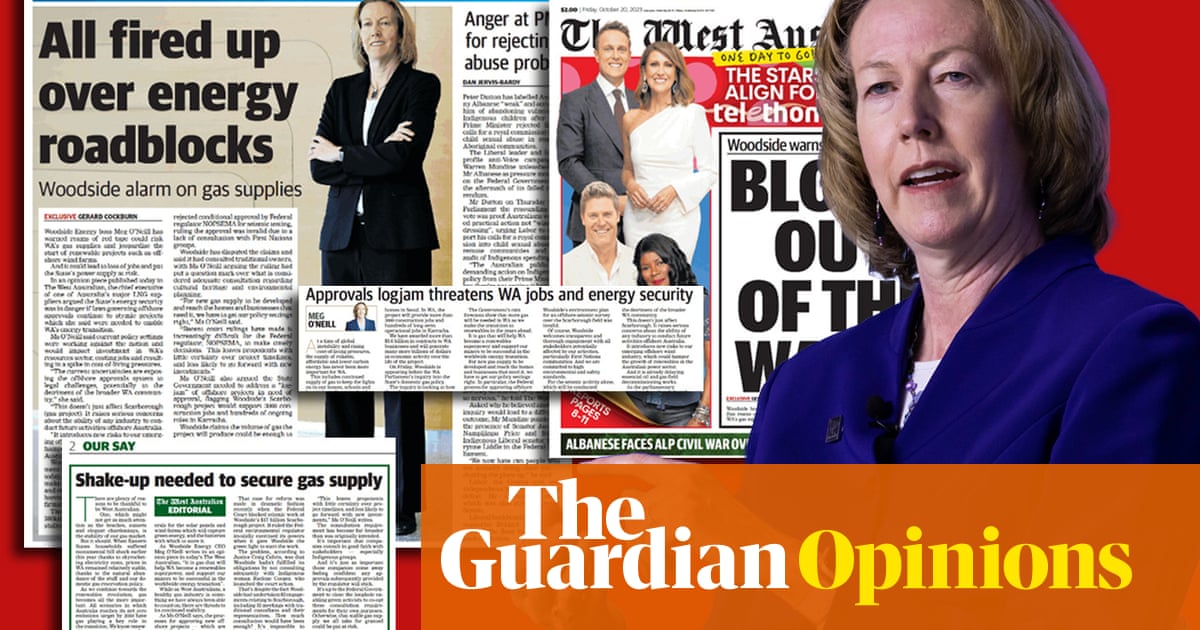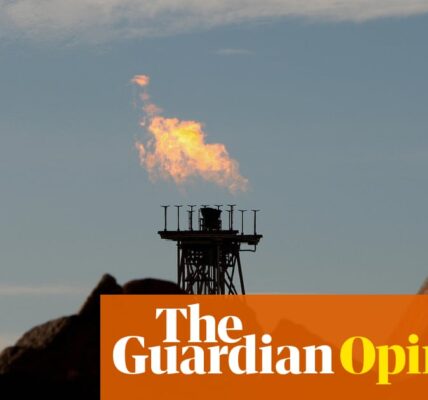The West Australian highlights Woodside’s statement about “keeping the lights on,” but fails to provide information on their stance on climate change to readers.

W
Who is responsible for covering the cost of newspaper advertisements? Woodside, a fossil fuel company located in Western Australia, does not have to pay for them based on recent events. They are able to publish their message without any opposition in Perth’s local daily paper, without having to spend any money.
On the previous Friday, there was a significant publication in the West Australian featuring a commentary from Meg O’Neill, who is the chief executive of Woodside and based in Perth. This publication was printed four times, making it quite prominent.
The report started on the first page, marked as “exclusive”, with the title “Devastating Impact” and a brief paragraph stating that O’Neill had raised concerns about bureaucratic barriers threatening gas reserves in Western Australia and potentially impacting employment and energy stability.
This front page splash pointed to a longer news story on page four. It explained O’Neill was concerned laws governing the approval of offshore gas developments were stymieing new developments. She argued those projects were needed “to enable WA’s energy transition” and a failure to fix the laws could lead to a spike in cost-of-living pressures.
The news report only included O’Neill’s opinion and did not mention any other perspectives. It was a condensed version of O’Neill’s full opinion piece, which was featured on page 50.
She emphasized her attention towards Woodside’s $17 billion Scarborough gas project, which encountered a legal obstacle last month. The federal court ruled against the approval of Woodside’s proposal to conduct seismic blasting in Scarborough, siding with Raelene Cooper, a Mardudhunera woman, who filed for a judicial review. Cooper argued that the offshore petroleum regulator should not have granted permission to the company without proper consultation with the indigenous owners.
The company claims that the delay in work has cost them tens of millions of dollars. In her article, O’Neill stated that Woodside had conducted thorough consultations with 11 First Nations groups and urged the government to collaborate with the industry to resolve the backlog of offshore approvals and facilitate the production of new gas.
The senior executives at the West Australian newspaper also agreed with O’Neill’s perspective. In their fourth article dedicated to his opinion, the paper’s editorial expressed the view that the Woodside CEO was right in highlighting the potential threat to WA’s reliable gas supply and called on the government to address a “loophole” that allowed “green activists” to manipulate consultation processes for their own agenda.
-
Subscribe to Guardian Australia’s complimentary morning and afternoon email newsletters to receive a daily summary of news.
The article’s biased reporting sparked criticism from reporters and environmental activists, both publicly and privately. This was viewed as being in line with claims from prominent individuals in WA that the gas industry holds significant influence over the state.
What about O’Neill’s points? They merit further examination.
Is Scarborough gas intended for use in homes, schools, and hospitals in WA?
She asserted that Woodside’s development of Scarborough was driven by the necessity for WA to have access to dependable, cost-effective, and environmentally friendly energy. This includes gas as a means to maintain electricity for residential, educational, and healthcare purposes, as well as to support the local mining sector in its crucial role towards achieving net zero emissions.
O’Neill did not state that all the gas from Scarborough would only benefit the local area. She mentioned that the gasfield would supply energy to both Western Australia and customers in Asia for a long time. However, the article suggested that Western Australians would receive the most benefits.
The situation is not exactly as it seems. The government has implemented a policy that mandates 15% of domestic gas to be allocated for local consumption, unless there is a different agreement in place with the government.
In Scarborough, Woodside has an agreement with Perdaman Fertilisers to primarily supply gas from the field for a urea plant in Pilbara. This means that only 5% of the gas will be allocated for domestic use, mainly for basic necessities like electricity in homes, schools, and hospitals. The remaining 85% will be exported as liquefied natural gas (LNG).
According to Alex Hillman, a previous staff consultant at Woodside who now works as a lead analyst at the Australasian Centre for Corporate Responsibility, only a small fraction of gas from other Woodside projects remains in Western Australia for local consumption. Hillman states that the Pluto gas field has only supplied 1% of its production to the domestic market, with the remaining 99% being exported as LNG.
Is there a need for more gas in WA?
O’Neill stated that to address a predicted shortage in local gas supply, WA would require the gas from Scarborough and other upcoming ventures. She refuted claims by activists that WA should reduce its reliance on gas, stating that government projections indicate an increased need for gas. She also noted that gas will play a crucial role in helping WA become a leader in renewable energy.
The main prediction mentioned by O’Neill pertains to the WA gas statement of opportunities, which is released by the Australian Energy Market Operator (Aemo). This document aims to provide information to gas companies and governments who are considering new investments. According to the statement of opportunities, there could be a potential demand for gas that is up to 5% higher than the available supply in this decade, and up to 16% higher after 2030.
O’Neill did not discuss the potential solutions to this issue, which the Aemo report only briefly touches upon. The options listed by Aemo include temporarily increasing supply from current production facilities and developing gas fields that were not previously included in forecasts.
The report also states that large gas consumers in the state may be moving towards using lower-emission energy sources at a faster pace. In simpler terms, they are taking measures to decrease gas consumption and increase the use of renewable energy. This aspect was not the main focus of the Aemo report, and it was not explored by O’Neill or the West Australian.
What is the impact of climate change?
One significant aspect of O’Neill’s editorial that should be noted is the absence of any mention of the urgent issue of climate change.
Gas was identified by Climate Analytic as the primary contributor to the increase in greenhouse gas emissions worldwide in the past decade. However, the International Energy Agency’s latest world energy outlook states that although gas will still be utilized for many years, the period of growth for fossil fuels has come to an end.
The statement does not signal a halt to investing in the oil and gas industry. However, according to the IEA, it does weaken the justification for allocating more funds. The agency suggests that worldwide investment will need to be reduced by approximately 50% by 2030 in order to achieve the goal of achieving net zero emissions by the middle of the century, which is a goal supported by Woodside and its supporters in Western Australia.
According to government data, the production and utilization of gas accounts for approximately one-fifth, or 21%, of Australia’s climate pollution. If the Scarborough and Browse gas fields, which are supported by Woodside, are developed, this would further contribute to the problem.
It is estimated that the export and combustion of LNG would greatly contribute to global emissions. For the Scarborough project specifically, the projected lifetime emissions could range from 880 million tonnes to 1.6 billion tonnes of CO2, which is over three times the annual emissions of Australia.
Hillman believes that Woodside’s business strategy is contributing to the problem rather than being a solution as we move towards a more environmentally friendly economy.
This is not an isolated perspective. Western Australian media consumers have the right to analyze it at the very least. They should also be made aware that Seven Group Holdings, the largest shareholder of the company that owns the West Australian, has a vested interest in a significant gas project in the state.
Source: theguardian.com


